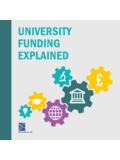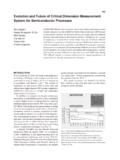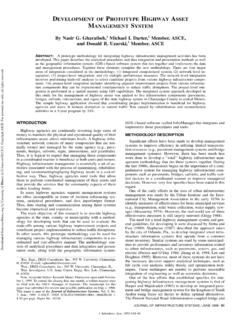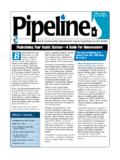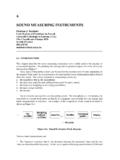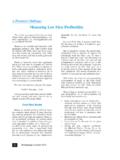Transcription of Measuring and recording student achievement
1 Measuring and recording student achievement30846 Debt 9/11/04 6:07 pm Page 1 Measuring and recording student achievementReport of the Scoping Group chaired by Professor Robert BurgessChair s foreword3 Executive summary4 Part 1: Introduction7 Background7 Methodology11 Part 2: Identifying and addressing the issues13 Introduction13 Section A: Describing, Measuring , recording and communicating achievement15 Representing achievement 15 Criteria17 The honours degree classification system17 Alternative methods of representing achievement21 Section B: Value added25 Dimensions of value added25 Issues affecting value added28 Obtaining data to determine value added29 Section C: Credit33 What is credit?34 Actual and potential benefits of credit35 Criticisms of credit37 Issues in the development of higher education credit in England38 Section D: General issues42 Consultation with key stakeholders42 Communication with key stakeholders43 Terminology43 Timing43 Leadership and ownership44 Contents1 Measuring and recording student achievement Universities UK/SCOPS ection E: Conclusions45 Conclusions45 Summary of recommendations45 Next steps47 Notes49 AnnexesAnnex AScoping Group terms of reference 51 Annex B Scoping Group membership 52 Annex C sub-group membership and terms of reference53 Annex D references562 Measuring and recording student achievement Universities UK/SCOPI am delighted to introduce the report of the Measuring and recording student achievement ScopingGroup.
2 It contains our recommendations for taking forward work in a number of areas which will be thekey to realising a successful future for UK higher education, providing a sound basis for describing, Measuring , recording and communicating student achievement in the Twenty-first century. As a Scoping Group it has been our task to scope issues rather than provide solutions and thus ourrecommendations are in the form of pointers towards future directions and further work which must betaken forward by the sector. Scoping was necessary because this is a vast landscape of complex issuesand in engaging in this task we have had to prioritise. Nonetheless, over the past nine months we believewe have cleared enough ground for there to be clarity and vision and a sound evidence base upon whichto build. In undertaking this task we acknowledged the need to recognise academic and institutional autonomy andalso the need for consensus in proposing change.
3 We were aware at the outset that the UK highereducation sector has already had many of these issues under active discussion and our scoping worksoon revealed that there had already been significant progress in many areas. We saw an important partof our task as acknowledging and recording this work as it represents a solid basis for future direction. Our ultimate aim is that students will benefit directly from the pointers we have proposed for furtherinvestigation and we were particularly concerned to put student interests at the heart of our deliberationsand in making recommendations. However, all stakeholders, internal and external, need to be involved inpursuing the next stage of are acutely aware that our recommendations represent a considerable programme of work which weare now handing to Universities UK and SCOPto take forward in partnership with the Funding Councilsand other organisations.
4 In addition we have, perhaps audaciously, set a deadline of the end of December2005 by which we think clear progress should have been made. The Group felt very strongly that, havingraised expectations within the sector, and among other key stakeholders and policymakers, there is aneed to maintain momentum in pressing ahead with these commending our report to the sponsoring bodies I would like to thank all those who have assisted us inour discussions. The report is the result of a team effort by all members of the Scoping Group andobservers, those who chaired the sub-groups, sub-group members and consultants and advisers, all ofwhom have given generously of their time and contributed much to our understanding of the issues thatneed to be resolved. Finally, all this work would not have been completed without the strong support ofGreg Wade, Clare Taylor and Helen Bowles, together with Jane Denholm of Critical Thinking who usedher expertise to shape our discussions into a coherent report that the whole Scoping Group Robert BurgessVice-Chancellor, University of LeicesterChair s foreword 3 Measuring and recording student achievement Universities UK/SCOPThe Measuring and recording student achievement Scoping Group was established by UniversitiesUK and the Standing Conference of Principals (SCOP), with the support of the Higher EducationFunding Council for England (HEFCE)
5 In October 2003 to review the recommendations from the UKGovernment White Paper The Future of Higher Education relating specifically to recording studentachievement, value added, degree classifications and credit was originally intended that the Scoping Group would meet twice. However, the scale of the workrequired it to meet five times between October 2003 and June 2004. In addition, following the Octobermeeting, a series of three sub-groups was established to undertake detailed work and identify issuesfor consideration and resolution by the full Scoping Group. It was not the function of the ScopingGroup fully to address and solve all of the issues. Its purpose was to: consider definitions and issues relating to the major themes; consider what problems or opportunities needed to be addressed; and recommend a programme of work, and who should take forward this work with reference to currentgood practice.
6 The scoping work has demonstrated that there is currently a considerable degree of work underway inthe UK higher education sector in matters of describing, Measuring , recording and communicatingstudent achievement . The Group also identified some major, as yet unresolved, issues. The full reportaddresses a number of these and suggests ways in which they could, and in some cases should, betaken forward. The key conclusions are that: Whilst the UK honours degree is a robust qualification which continues to serve us well, the existinghonours degree classification system has outlived its usefulness and is no longer fit for should be further investigation of alternative classificatory systems for representingachievement which better meet the needs of different audiences and a set of criteria need to beidentified and agreed for the purpose of evaluating such a system.
7 There is merit in incorporatingsome of the existing initiatives in this area including the higher education Transcript, the ProgressFile and Personal Development Planning. Account must also be taken of developments elsewherein the UK, in other sectors and European developments such as the Diploma Supplement and theEuropass; The sector should actively investigate the feasibility of designing models for predicting value addedfor potential students. Existing databases could be used to this end but any proposals will need tobe carefully trialled and piloted with students and institutions to determine their robustness andusefulness; andExecutive Summary4 Measuring and recording student achievement Universities UK/SCOP Whilst acknowledging the autonomy of higher education institutions, the sector should work towards aeffectively with the Scottish Credit and Qualifications Framework and the European Credit TransferSystem (ECTS) in Europe.
8 To bring this to fruition, terminology will have to be agreed and Scoping Group makes the following recommendations:Recommendation 1: there is a need for further investigation of classificatory systems for theappropriate and effective representation and communication of learning and 2: a series of criteria for an effective system of representing and communicatingstudent achievement should be identified and agreed by the higher education 3: since the current system of degree classification no longer provides a sufficientmeans of summarising student achievement , it should be 4: proposals for changing the degree classification system should not merely focuson the undergraduate degree but should take into account the complete range of higher 5: developments in describing, Measuring , recording and communicatingachievement should take place in parallel with, and as complementary to, the Diploma Supplementand ultimately the 6: higher education institutions should continue to implement Personal DevelopmentPlanning within the guidelines developed by the Progress File Implementation Group.
9 There shouldcontinue to be evaluation of the impact of learning and the representation of learning and achievementof different forms of Personal Development 7: in taking work forward on recording achievement in higher education full accountshould be taken of existing congruent practice including developments in schools and furthereducation colleges, in the UK and elsewhere in Europe. The opportunity should be taken particularlyto ensure that this dovetails with emerging proposals and policies for 14-19 education. Attemptsshould be made to ensure that optimal transitions for students, from school and further education intohigher education, and within higher education itself, would be 8: the feasibility and value of adopting, adapting, extending or designing a model forpredicting value added to students of undertaking particular higher education studies should beactively pursued.
10 This could include a range of factors such as financial value added and acomparison of the performance of different cohorts of students. 5 Measuring and recording student achievement Universities UK/SCOP common further and higher education credit system for England, Wales and Northern Ireland, articulatingRecommendation 9: since it will be necessary to achieve a common understanding in developingcredit proposals, credit terminology, the relationship between credit systems and qualificationframeworks, and their respective functions and parameters, should be defined and 10: the stakeholder organisations should strive for a common higher educationcredit system in England, Wales and Northern Ireland which would help facilitate continueddevelopments of local/regional schemes for student 11: following agreement on a credit system, a concerted effort should be made toachieve more consistent and widespread use of credit in higher education.

